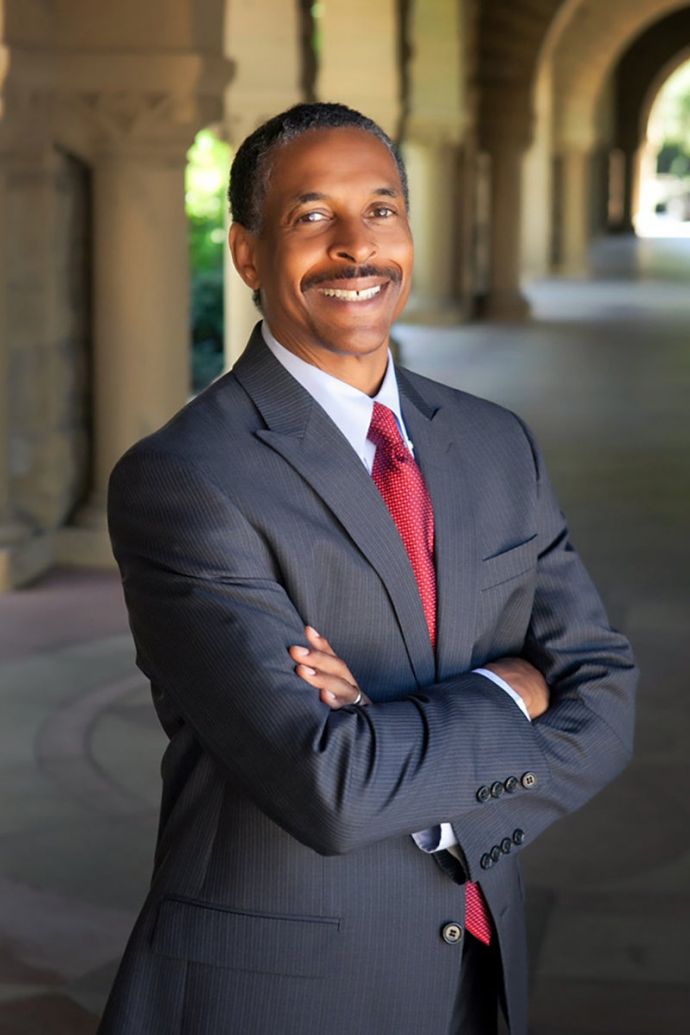Provost Persis Drell announced several new appointments intended to lead equity and inclusion efforts at Stanford, support internal communities within the university and develop strategy for the next wave of innovation in digital education.
- Patrick Dunkley will serve as vice provost for institutional equity, access and community. In this role, he will serve as executive director of the university’s IDEAL and racial justice initiatives, and also direct the Office of Institutional Equity and Access, providing leadership for critical programs that support internal communities at Stanford.
- Shirley Everett will serve as senior adviser to the provost on equity and inclusion. Dr. Everett has decades of experience leading one of the most diverse organizations at Stanford. She will represent, on the provost’s staff, the voices of front-line staff and the needs of staff communities of color at Stanford. Everett also will continue to serve in her current role as senior associate vice provost for Residential & Dining Enterprises and as a member of the university’s cabinet.
- Stephen Chen, currently a supervisory attorney in the Denver regional office of the U.S. Department of Education’s Office for Civil Rights, will serve as Title IX coordinator and director of the SHARE Office (Sexual Harassment/Assault Response and Education) at Stanford. This position oversees the university’s Title IX response and prevention efforts as well as policy concerns related to sexual harassment, sexual violence and other prohibited conduct.
- Matthew Rascoff will serve as special adviser to the provost for digital education and innovation. Rascoff will work with partners across the university to design and implement a long-term strategic plan for digital education at Stanford.
“From listening to the Stanford community, we know that we need to build organizational strength in these areas that are critical to the wellbeing of our community and to the future of the university,” Drell said.
“The work of these individuals will help us live up to the promise that all members of our community, of every background and experience, are valued, appreciated, can do their best work and have opportunities to grow and advance at Stanford while being their authentic and genuine selves. And these individuals will help us develop and coordinate activities across the university and execute on strategy to ensure we make real progress on key institutional objectives we’ve set for ourselves.”
Patrick Dunkley
Dunkley has served Stanford for more than 19 years in a variety of leadership roles. He currently serves as deputy athletics director and senior university counsel, overseeing human resources, legal affairs and NCAA compliance in the athletics department. Dunkley also currently serves as co-chair of the university’s Community Board on Public Safety, which was created to advise university leadership on community safety and campus policing, and co-leads the IDEAL Staff Advisory Committee.
In addition to his new role as vice provost, Dunkley will serve as special adviser to the president on equity and inclusion. In this role, he will specifically work with the president on recommendations made by the Community Board on Public Safety and the Black Community Council.
As vice provost for institutional equity, access and community beginning May 1, Dunkley will have two principal areas of focus.
First, he will provide day-to-day management for the university’s IDEAL (Inclusion, Diversity, Equity and Access in a Learning Environment) and racial justice initiatives as the executive director of IDEAL. Dunkley will work with the provost to oversee progress, facilitate community engagement, develop feedback mechanisms and metrics and provide coordination of activities across the university supporting equity and inclusion.
Second, Dunkley will oversee the Office of Institutional Equity & Access, which includes the SHARE Title IX Office, the Ombuds Office and the Diversity & Access Office. These offices work to ensure that members of the Stanford community are able to work, live and study in an equitable, just and safe environment. Activities in the unit include prevention and response to sexual harassment and sexual violence; compliance with policies and laws that ensure equal opportunity and equal access for individuals with disabilities; and confidential dispute resolution for members of the community experiencing conflicts or concerns.
Lauren Schoenthaler has led Institutional Equity & Access for the last five years, where among other things she has expanded training related to sexual harassment and sexual violence, instituted the annual publication of the Title IX/Sexual Harassment Report, overseen the merger of several offices into the new SHARE Title IX Office and overseen the implementation of new Title IX/SHARE procedures.
Schoenthaler will be returning to the Office of General Counsel, where she serves as senior university counsel. “We are immensely grateful to Lauren for her tireless efforts in leading the university’s response to sexual harassment and sexual violence,” Drell said. “Her commitment, her energy and her deep care for the well-being of students have been so important in our efforts to make improvements and create the campus culture we aspire to.”
Shirley J. Everett
Everett has been at Stanford since 1991 and leads Residential & Dining Enterprises (R&DE), an organization with more than 800 FTE responsible for student housing, dining and executive services, conferences and hospitality and auxiliaries (including catering and cafes).
Everett leads one of the most diverse organizations on campus and brings extensive experience managing a complex enterprise that spans more than a third of the campus physical plant and provides essential support for members of the university community. She is passionate about advancing equity and inclusion for staff. Within R&DE, Everett has created numerous staff development programs to enhance the lives of staff, such as Stepping Stones for Success, and apprenticeship programs that allow workers to enhance their skills and advance in their careers.
For many years, Everett has been deeply engaged in initiatives to bring forward the experiences and voices of staff of color at Stanford and has advised and mentored staff across the campus. Everett serves as a member of the Black Community Council, appointed by President Marc Tessier-Lavigne, which is working to create accountability by assessing progress and reporting to university leadership on how Stanford can address the needs and concerns of the Black community.
She also is a leader in the IDEAL Staff Advisory Committee that is advising Vice President for Human Resources Elizabeth Zacharias on making Stanford more equitable and inclusive for all staff, especially staff of color.
Everett also facilitated conversations between the provost and Black staff in the fall of 2020, intended as a catalyst for change in response to the national events following the murder of George Floyd. Starting May 1, Everett will take on the additional role of senior adviser to the provost on equity and inclusion.
Stephen Chen
Chen will begin in mid-May as Title IX coordinator and director of the SHARE Title IX Office. He comes to Stanford from the U.S. Department of Education’s Office for Civil Rights, which is responsible for enforcing federal civil rights laws, including Title IX, that protect individuals from discrimination in federally funded educational institutions.
Chen has been with the agency since 2001 in positions in Washington, New York, San Francisco and Denver. He currently serves as a supervisory attorney and program manager in the agency’s Denver regional office, overseeing the investigation of civil rights complaints and leading national projects and teams on diversity and inclusion, employee engagement and other issues.
The SHARE Title IX Office oversees the university’s response and prevention for Title IX prohibited conduct as well as policy concerns relating to sexual harassment, sexual assault, stalking, domestic and dating violence and retaliation concerns relating to reports of such acts.
The office was created through the recent merger of the Title IX Office, the Sexual Harassment Policy Office and the SARA (Sexual Assault Relationship Abuse Education & Response) Office. As Title IX coordinator and director of the office, Chen will oversee the university’s sexual harassment and sexual violence investigations, oversee education and prevention efforts and work with partners across the university to build a culture free of harassment and violence.
Chen met with more than 80 students, staff and faculty in the Stanford community as part of the interview process and received enthusiastic support from all sectors, Drell said. Chen will report to Dunkley, with oversight also from the provost and the vice president for human resources.
Cathy Glaze has been serving as interim Title IX coordinator and also held the position prior to her retirement from Stanford in 2018. She will continue to serve during the transition.
Matthew Rascoff
In his role as special adviser to the provost for digital education and innovation, Rascoff will focus on developing long-term strategy for Stanford’s work in digital education.
While the COVID-19 pandemic forced a rapid shift to online learning, it also has revealed new opportunities for expanding and optimizing digital education. As special adviser, Rascoff will work to develop a university-wide strategy in this space, collaborating closely with others across the university who are engaged in online learning. Those include the Stanford Center for Professional Development, Continuing Studies, Executive Education in the Graduate School of Business, the Stanford Center for Continuing Medical Education and others.
Rascoff also will advise Stanford’s deans on school-level digital strategies while working to build university-wide alignment.
Rascoff previously served as associate vice provost for digital education and innovation at Duke University, and as vice president for technology-based learning and innovation for the University of North Carolina system. He began work at Stanford on April 1.



